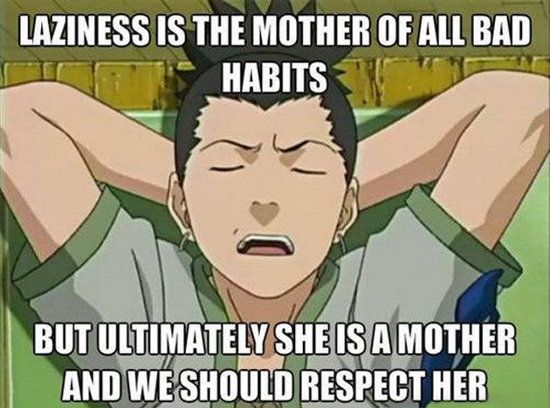First off, I would like to point out the following: I am fully aware of the fact that, after they are done reading this editorial, workaholics worldwide will probably want to bite my head off, punch me in the face, and then feed me to the wolves.
Not necessarily in this order, and provided that they are patient enough to make it to the end of the editorial and not to dismiss it on account of its title alone, of course.
To them I say: just go ahead and do it. I have been touched by the alleged laziness demon, therefore, cannot be bothered to care, not to mention the fact that I see absolutely nothing wrong with being this way.
What's more, I am convinced that there are perks to wanting to put as little effort as possible into doing things, and that people should just stop telling others "you're lazy" like it's a bad thing.
Laziness is in our nature, and it can actually prove beneficial for the body and the mind. Besides, it takes skill to be the right kind of lazy, and, according to several studies (that's right, I'm dragging science into this), some people cannot even help it.
If I've managed to spark your interest, do carry on scrolling down.
How Natural Is Laziness?
Cool gadgets and fancy cars aside, humans are part of the natural world, and the natural world happens to be a big fan of conserving energy and putting as little effort as possible into getting things done. Simply put, laziness is hard-wired into our biology.
Lions, together with other cats, can spend up to 20 hours a day sleeping. They will wake up to go looking for food and sweet lovin' every once in a while, but, as soon as these needs are fulfilled, they will go back to napping.
The same is true for pretty much all the other living creatures, humans included. What I am saying is that conservation of energy is a natural phenomenon and that, when a creature's basic needs, i.e. food, shelter, romance, are dealt with, the drive to work is reduced.
What's interesting is that, according to evidence uncovered by science, it is possible that some people are made lazy by a so-called couch-potato gene. This gene makes people lying around, doing absolutely nothing, feel incredibly good.
As detailed in the video below, this couch-potato gene is a mutation in a normal gene that regulates physical activity. Folks who have this mutation don't derive as much pleasure from physical activity as other people do, hence the fact that they are lazier.
To put it in a nutshell, feeling and being lazy is a perfectly natural and rational response to being in an environment that meets one's basic needs and, therefore, makes survival possible. What's more, genetics has a say in the matter and explains why some people are lazier than other.
If Laziness Is Natural, Why Do People Keep Badmouthing It?
If you pay close attention, you will notice that the reasons why laziness is so often frowned upon have very little to do with biology, and quite a lot to do with sociological aspects. Otherwise put, laziness is not approved of because society places great value on productivity, status, and achievements.
What I mean is that, in this day and age, folks who don't feel the need to bend over backwards to acquire a certain status or who are not interested in shooting for the stars or having it all are often considered individuals of low value.
The same principles apply when it comes to folks who happen to be a tad too plump for society's taste, despite the fact that storing fat in order to have something to live on, should food availability ever become an issue, is also natural and hard-wired into our biology.
Long story short, society has taken it upon itself to label laziness a problem that needs to be fixed. However, it aims to fix this problem not because of biological reasons, but because laziness does not get along all that well with modern values.
Can Laziness Be a Good Thing?
Unless taken to the extreme, laziness can be a good thing. In other words, there is a right kind of lazy, when one sees to it that their basic survival needs are met and then sits back and enjoys a nice glass of wine, maybe even a movie, and a wrong kind of lazy.
This wrong kind of lazy comes into play when people not only make no efforts to put the latest Rolls Royce model in their garage, but also fail to ensure that their quality of life is at least satisfactory. Needless to say, this wrong kind of lazy is the one that can get you in trouble.
The right kind of lazy has its perks. To begin with, it helps the body and the mind get some much-needed rest and, by doing so, it can actually prove beneficial to one's health. So, if you wake up one morning and feel like doing nothing at all, that is probably your body telling you it needs a break.
Besides, I hate to tell you this but, if you take the time to think about it, many advances in modern technology are the by-product of laziness. Thus, cars eliminate the need to spend energy walking around, and washing machines mean we don't have to do the laundry ourselves.
Lastly, it need be said (and then underlined, colored in bright pink and signaled with flashing lights) that laziness is not the opposite of productivity. On the contrary, laziness is just a different kind of productivity. Now don't go scratching your heads just yet.
What I mean is that, since spending hours on end working hard is pretty much out of the question for them, lazy people are forced to make the most of the time they do spend working. This means that, to get a job done with as little effort as possible, they have to be incredibly resourceful.
Otherwise put, it all boils down to how one chooses to define productivity. There are people in this world who view productivity as always trying to do more and never getting caught doing nothing, and others who view productivity as being as efficient as possible when it comes to accomplishing one task or another so as to limit energy expenditure and then get back to relaxing.
What's interesting (and quite ironic, I dare add) is that, frantically juggling all sorts of activities, be it at the office or at home does not guarantee that one is being productive. Thus, some people burn a whole lot of energy doing one thing or another, but, at the end of the day, have nothing to show for it.
Other folks almost never look busy but, when all is said and done (once again, with as little effort and as efficiently as possible), those around them will notice that, without burning too much energy or straining their body and mind, they've scored several accomplishments. And I'm not the only one saying this.
The Bottom LineI don't care what society says, laziness is not some perverted demon that's come to ruin people's productivity and plunge the world into the hell that is relaxation. It's natural, perfectly OK, and not at all opposed to getting things done.
Now, if you're not too lazy yourselves, perhaps you might want to share your thoughts on the topic in the comments section below.

 14 DAY TRIAL //
14 DAY TRIAL // 






